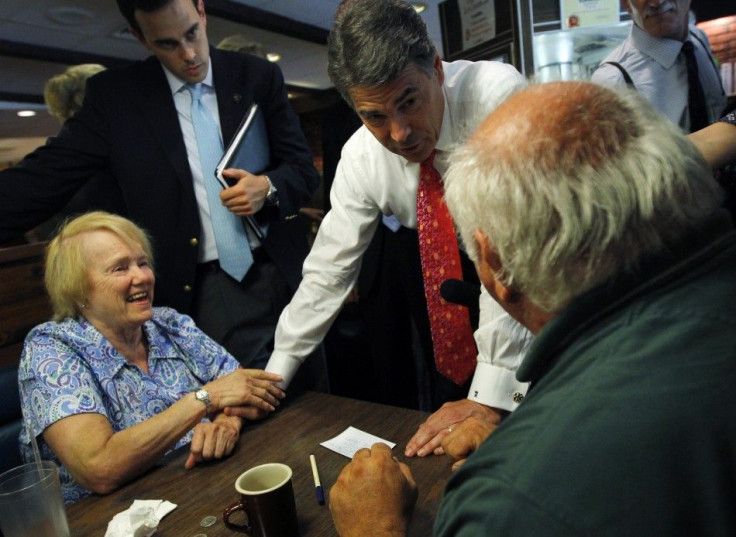Rick Perry Ahead of Mitt Romney in Latest Poll, But Not by Much

Yet another poll has shown Rick Perry in the lead for the Republican presidential nomination, cementing his frontrunner status and relegating the party's former stars to the sidelines.
In a Washington Post-ABC News poll released Wednesday, 27 percent of registered Republicans and Republican-leaning independent voters said they would vote for Perry if their state's primary were held today, compared to 22 percent who said they would vote for Mitt Romney.
All of the other primary candidates finished well behind Perry and Romney. Sarah Palin came in at 14 percent, Ron Paul at 8 percent, Michele Bachmann at 6 percent, Newt Gingrich at 4 percent, Herman Cain at 3 percent, Rick Santorum at 2 percent and Jon Huntsman at 1 percent. Palin finished third in spite of not being an official candidate. If she does not end up running, the poll found that her supporters would vote for Perry over Romney.
The margin of error was plus or minus 3.5 percentage points, so statistically, Perry and Romney are locked in a tight race, but Perry's victories in several other recent polls would seem to give him the edge. His advantage has, however, been shrinking. Three polls conducted just after he entered the race - Gallup, CNN and PPP -- showed him with double-digit leads over Romney. A Quinnipiac poll last week showed him ahead by 6 percentage points, and now the Washington Post-ABC News poll shows him 5 points ahead. It remains to be seen whether he can maintain his broad support as voters become more familiar with him.
Still, the numbers reflect a race that has changed dramatically since Perry entered it. The last Washington-Post-ABC News poll -- conducted in mid-July, before Perry declared his candidacy -- showed Romney with 26 percent of the vote, Palin with 18 percent and Bachmann with 12 percent. Perry has taken support from Romney, Palin and Bachmann alike, which illustrates the breadth of his appeal among Republicans.
It bodes especially badly for Bachmann, who is quickly losing ground as the Tea Party's favored candidate. It is significant that Perry, who is a staunch conservative but has not affiliated himself with the Tea Party, is still gaining substantial support from its ranks. It is also significant that Palin, a prominent Tea Party member, is outpolling Bachmann without even entering the race. (Palin's base is very narrow, though, and the odds would be strongly against her in the general election even if she did enter and win the primaries. The Washington Post-ABC News poll found that only 32 percent of Republicans believe she is qualified to be president.)
A plurality of Republicans said Perry was closest to them on the issues. Interestingly, a plurality -- 30 percent -- also said they believed Perry had the best chance of defeating President Obama in the general election, while 20 percent said Romney had the best chance. However, the poll showed both Perry and Romney statistically tied with Obama in a hypothetical matchup. Perry had 47 percent to Obama's 46 percent and Romney 46 percent to Obama's 46 percent, which indicates that Perry and Romney would have about equal chances of winning the presidency if nominated. Obama won by several percentage points in hypothetical matchups against Palin, Bachmann and Huntsman.
© Copyright IBTimes 2024. All rights reserved.











